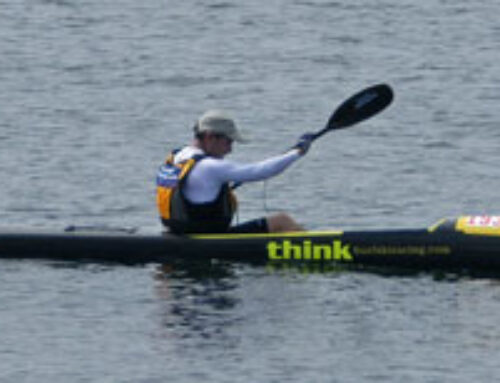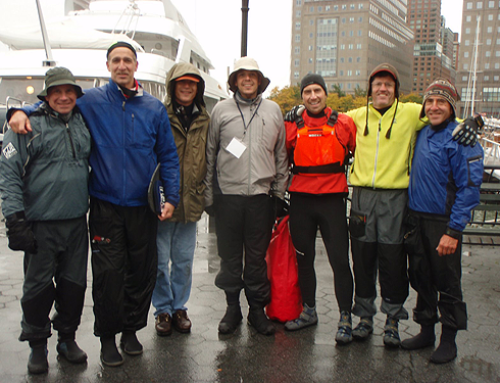I have become very parochial in my old age, rarely leaving the southern Maine town in which I live. But I know I need to venture out more, so when a 15 mile open water race in Narragansett Bay was advertised, I thought “Kinley, you should be able to struggle through a weekend in greater Newport, and you’ll get to row right under the bridge on the Rhode Island quarter.” After much hand-wringing about whether this would be too much excitement for my fragile constitution to bear, I reserved a cage in a kennel for my dog, booked a room in North Kingstown for me, and sent 50 bucks to Dan Gorriaran. Felt very guilty about the dog.
Fast-forward through the tropical storm forecast, and Dan’s email advising that the race would be relocated to a river in Providence, thus removing both the open water enticement and the Newport enticement. I considered how if others were flying across the continent to participate, I should at least be able to drag myself 3 hours south on I-95, even without enticements.
So Friday I loaded up the truck and started out. In the rain. Now I should point out that my truck is old enough to be graduating from high school, and tends to shimmy at speeds in excess of 50 mph. I have a car that’s roadworthy, but it’s set up to carry my surfski, not my Maas, and after thinking the matter over, I had decided to risk taking the truck, and if it fell off the road in suburban Boston, well, my mechanic would lose out on a major source of income. Fortunately, between the poor visibility, slick roads, heavy Friday traffic, and the Bay State’s expenditure of stimulus funds on construction projects, the truck had no opportunity to misbehave as we never reached its threshold of unhappiness.
Massachusetts had programmed all the electronic signs above the highway to say “Thanks Ted *blink* from the people of Massachusetts *blink* Thanks Ted *blink* from the people of Massachusetts *blink* Thanks Ted *blink*” and I wondered why the signs couldn’t be rigged up to say “Don’t talk, text or tailgate *blink* and turn on your lights in the rain *blink* don’t talk, text or tailgate *blink* and turn on your lights in the rain.” Heavy traffic in lousy conditions is very unnerving. Or maybe I’m just a hick who needs to get out more.
Eventually I reached Providence, and decided to scope out the location of the Narragansett Boat Club, so that I would be able to find it the following morning. There was surprisingly little activity the boat house; someone named Scott was rigging a boat, and another Scott was hanging around. I had anticipated a bevy of race organizers tearing their hair out. I went outside and stood on the dock in the rain. Mark Allen rowed up, reported that Rich K was out there somewhere, and implied that Rich might be rowing farther than good sense would suggest.
Of course good sense would suggest canceling my reservation in North Kingstown, and getting a room in Providence, but flexibility is not my strong suit, so I rejoined the throngs streaming — or attempting to stream — south on the bleary gray highway. By then I was entirely stressed out, and my earlier thoughts of touring Jamestown to look at the original race course had flown entirely out of my brain. I just wanted to unclench my bloodless white knuckles from the steering wheel and stop driving. I found my hotel, arranged for a 5:00 wake-up call, and crawled into bed.
The next morning, when I emerged from my room, I was surprised to see several other shells and a kayak in the parking lot: apparently I wasn’t the only one too clumsy to change plans. Or maybe the others were coming from the south, and hadn’t gone out of their way to honor their reservations.
I headed out in the dark, and made it back to Providence in jig time on an empty road. But there my troubles resumed. I got lost. Really lost. It was still dark. I couldn’t read the directions. I couldn’t see my atlas. The interior light in my truck hasn’t worked since the first Clinton administration. I had a sense of where I should be heading, so when I saw Angell Street, and it was one way in the opposite direction, I thought “That’s weird, last night Angell Street was heading toward the boat house, and today it’s heading away from the boathouse,” and didn’t turn around. Such is the caliber of my thinking in the early AM. At one point I saw a car with a shell traveling perpendicular to me, but a red light intervened, and I couldn’t see where it went. Time was marching on, and I felt like the doomed passengers in the Poseidon Adventure who are straggling toward the sinking stern while other passengers with better sense of direction pass wordlessly by on their way to being rescued.
Finally I stumbled on the boathouse about 6:30, the time announced for the skippers’ meeting. By then flames were coming out of my head. But the volunteer who told me where to park was very polite and didn’t mention the flames. I unloaded my boat, placing the skeg in a depression in the ground to obviate the need for slings, which I didn’t bring, found the port-a-potty, grabbed a banana, and time to launch. Wow! There’s a line! I’d forgotten about this whole flat water culture of dock-launching and holding your boat while waiting your turn. But when my turn came, the dockmaster was very nice as I explained that I was being slow because I wasn’t used to dock-launching, and was disoriented not to be standing in water when I put my oars in the oarlocks. Again, flexibility is not my thing. Nor clear thinking in the early morning.
At last I’m on the water, rowing toward the start of a flat water race course for an open water championship. It’s raining lightly. The race starts. I’m more or less last off the line of the women in my boat class. I row toward the lane markers posted on a bridge just downstream of the boathouse. The lane markers would be on the race course, right? Darn, apparently not. I realize as I near the bridge that I should be passing through an arch near shore, like everyone else. Too late. More bridges! More arches! It’s all so confusing. Then we get to buoys, navigational aids. My recollection that we should stay to the outside of the buoys is aided by the obvious hazards they mark — derelict wharves and pilings, and abandoned barges. By now we’re about a mile into the race, and there’s a red Peinert about even with me, another Maas 24 just ahead of me. The woman in the Maas stops, and takes the longest wardrobe break I have ever seen in a race. A vest comes off. Then jacket. It all takes time. Hey I passed somebody! Even if she did stop rowing.
The river widens out. We had been instructed to stay to starboard of committee boats that would be stationed in the middle of the river, but the boats are under power and moving around, and I can see the leaders of the men’s touring division coming up behind me and cutting to the inside of the “stake” boat with no obvious consequences. What are we doing? Where are we heading? We row along a concrete pier covered with piles of coal. A security vehicle prowls the waterfront, and an ominous sign warns us not to anchor. Still not a ripple in the water as we pass by a collier. The “can’t-miss-it” sno-cone where we are supposed to turn is lost in the drizzly gray. I’m following other boats. The gig and whaleboat, which had an early start time, pass by in the opposite direction heading back to the boathouse, followed by the fastest of the sliding doubles. I overtake an Alden double, but, on the other hand, it’s becoming clear that the clothes horse is catching me again.
Just past the turn there’s a little lighthouse with a mansard-roofed keeper’s cottage that looks like a model for a Hopper painting. It’s the first bit of scenery I’ve seen that reached beyond energy infrastructure or decayed industry. We row back upriver. A handful of the touring men pass me, and a very fast surfski. The red Peinert has saved something for the end. I’m going to finish last in my class. Too much ice cream and not enough exercise. Alas.
But wait. Here comes Mark Allen around the corner. And he’s not passing me like he did at Blackburn. A tight group of surfskis is gaining, but not any more quickly than one would expect. Maybe this isn’t the end of life as I know it. Or maybe it is. Who knows.
The race was over. It began raining harder. People gathered in the boathouse, and on an upstairs deck, which was partially covered with tenting. I’m the world’s worst socializer, but when you’re crowded sardine-style under a semi-shelter trying not to get any wetter than you got rowing 10 miles in the rain, it’s hard not to talk to anyone. So I talked to people, ate some food, watched the winners collect their medals, then drove home. In the rain.
THE END


Leave A Comment
You must be logged in to post a comment.